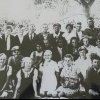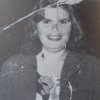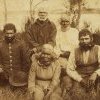1940s
1940
1941
Pearl Gibbs (Gambanyi), 1901—28 April 1983, makes the first radio broadcast by an Aboriginal person. She is a prominent Aboriginal activist in the Aboriginal rights movement. She is a member of the Aborigines Progressive Association (APA) and is an organiser for various protest events such as the 1938 Day of Mourning.
1942
The family of Jean Carter have lived at Saltpan Creek, and are now another family who have been evicted and have come to La Perouse. At La Perouse, the risk of child-removal is much greater than when living deep in the bush. Here Auntie Jean Carter [McKenzie] recalls her removal, and that of her siblings: "Most of the time I remember being in the bush getting five-corners and lilli-pillis, or down the beach. We used to get up really early in the morning with Mum and we used to go into the bush, she’s open up these little sugar-bags, and make a little handle, and pick this little bush when the dew was still on it, lay the gum leaves one way, and the other green ferns the other and pack it in a bag. I still hear that crispy sound you know. We used to walk round the houses, white people’s houses, and sell the little bunches of these things. Wasn’t much around.
I used to love condensed milk, that was a real luxury, and peanut butter. Those two foods were me favourites. My auntie, we used to go over to her place a fair bit, that was my father’s sister. And one of my cousins Joycie, and Norman, and Margie, she was the real pretty one. ... I just remember coming home, and Mum was at the door, and there was this car on the road outside. There was this white woman standing there, and I can hear mum saying, "Can’t you give me time to get the kids ready?", and She said, "No, they’ve got to go now", "something like that. One minute we was comin’ home to the house, and the next instant we were in the car and gone.[ I can’t remember whether Tommy, who was just a baby, was in the car, I just know we were going to the Bomaderry or Cootamundra homes: Jean, Ruth, Tommy, Sally and Robert.]" Edwards and Read, The Lost Children, p 3-5
1945
The proportion of factories located in the inner city declines from 68% to 32%.
1946
Auntie Gloria Ardler, speaking in 2000, recalls: "My father... couldn’t come and see us when we were on the [La Perouse] mission. He wasn’t married to my mother but he was Aboriginal. He wasn’t allowed to come in there. He had a little tent outside the fence". Hinkson and Harris, Aboriginal Sydney, p 112.
1947
1948
Gladys Ardler recalls: "Women could work during the Second World War because there was plenty of work and that around. Everybody was working … my husband was in a good job. There was plenty of work around… There was no one on the dole… Everyone had plenty of money. People worked at the Mobil oil refinery at Botany. Men and women also worked at factories like Davis Gelatine the felt and textile industries, as well, and as cleaners and cooks at the Coast Hospital or as production line workers for Sweet Acres".















